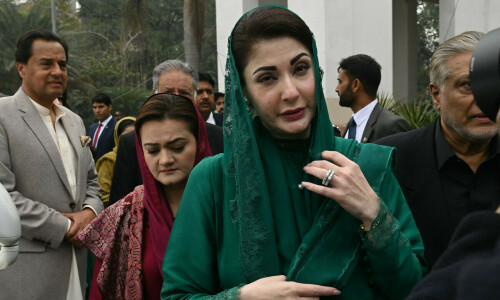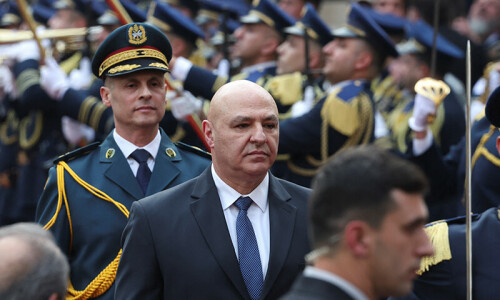Imran’s dilemma in acquiring opposition leader’s slot

ISLAMABAD, May 12: PTI chairman Imran Khan may climb down over his words of going solo in the National Assembly if he wants to become leader of opposition after shattering of his dream to become prime minister after Saturday’s polls.
In other words, he will have to negotiate with the PPP or the Muttahida Qaumi Movement, that if the two parties also decide to sit on the opposition benches, to gain their support to get the opposition leader’s office.
The PTI chairman, in his election campaign and interviews, has said in clear-cut words that he would not join hands with the PPP, the PML-N and the MQM – the parties which remained in power at the centre or in provinces during the past five years. He even once said that he would prefer to sit on the opposition benches if he had no option but to form the government with the support of any of these parties.
Mr Khan is being presently tipped in TV talk shows as the future opposition leader, but the number of seats the parties have bagged so far, according to unofficial results, clearly shows that if the PTI chairman stands by his words and does not negotiate with the PPP or the MQM, then he cannot get that position, according to the assembly rules. In this case, the office can be attained by a joint nominee of the PPP and the MQM.
The Rule 39(2) of the Rules of Procedure and Conduct of Business in the National Assembly 2007 says: “After the ascertainment of the leader of the house, the speaker shall inform the members about the date, time and place for submission of a name for the leader of the opposition under their signature.
“The speaker shall declare a member as leader of the opposition having the greatest numerical strength after verification of the signatures of the members.”
The rule was amended in 2007 when the speaker of the 2002 National Assembly, Chaudhry Amir Hussain, did not appoint any member as the opposition leader for a whole year since there was no mention of a timeframe to do so.
A controversy arose when Mr Hussain declared Maulana Fazlur Rehman of the defunct Muttahida Majlis-i-Amal (MMA) opposition leader despite having the support of lesser members than those of another opposition alliance – the Alliance for the Restoration of Democracy (ARD) – using his discretionary powers to appoint any member for the post who according to his own assessment enjoyed the support of the majority of opposition members.
Now the speaker no more enjoys discretionary powers and is bound to seek nominations for the office in writing from the members sitting on the opposition benches.
When contacted, members from both the PPP and the MQM said it was too early to make any comment on the issue since the results of the elections were still incomplete. They said they could not make any comments without discussing the issue in their parliamentary party meetings.
The PTI chairman in his speeches and interviews criticises almost all the leaders of other parties – be it the PML-N, the PPP, the JUI-F or the MQM. During his campaign, he not only accused the previous cabinet members in the PPP-led coalition government of committing huge corruption, but also declared that he would not take oath from President Asif Ali Zardari if elected as prime minister.
He had also dubbed the MQM as a “terrorist” party in his several speeches and interviews. Political observers believe that it will be interesting to see whether Imran Khan will sacrifice the office of the leader of opposition for the sake of his commitment and credibility or will show flexibility and make a compromise to get the slot which is considered to be the second most coveted office in the National Assembly after the prime minister.













































